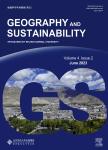Stepwise Ecological Restoration:A framework for improving restoration outcomes
作者机构:Henan Provincial Key Laboratory of Hydrosphere and Watershed Water SecurityNorth China University of Water Resources and Electric PowerZhengzhou 450046China School of Environmental Science and EngineeringSouthern University of Science and TechnologyShenzhen 518055China Department of Health and Environmental SciencesXi’an Jiaotong-Liverpool UniversitySuzhou 215123China
出 版 物:《Geography and Sustainability》 (地理学与可持续性(英文))
年 卷 期:2024年第5卷第2期
页 面:160-166页
核心收录:
学科分类:07[理学] 09[农学] 0903[农学-农业资源与环境] 0713[理学-生态学]
基 金:the Shenzhen Science and Technology Program(Grant No.KCXFZ20201221173601003) the Henan Provincial Key Laboratory of Hydrosphere and Watershed Water Security
主 题:Ecological restoration Reference ecosystem Restorative modes Sustainable development
摘 要:Ecosystem degradation is one of the critical constraints for the sustainable development of our ***,recovering an ecosystem to a pre-impairment condition is often not *** International Restoration Standards provide the first framework for practical guidance on what constitutes the process of ecological repair and how this repair process can be influenced to improve net ecological *** these Standards,Restorative Continuum is highlighted and it recognises that many do not,yet there is still value in aspiring to improvements to the highest extent possible,with some sites potentially being able to be improved in a stepwise *** we elaborate on these Standards by providing a cross-ecosystem theoretical framework of Stepwise Ecological Restoration(STERE)for promoting higher environmental *** allows the selection of suitable restorative modes by considering the degree of degradation while encouraging a transition to a higher *** models include environmental remediation for completely modified and degraded ecosystems,ecological rehabilitation for highly modified and degraded ecosystems,and ecological restoration for degraded native *** requires selecting tailored restorative modes,setting clear restorative targets and reference ecosystems,applying a systematic-thinking approach,and implementing a continuous monitoring program at all process stages to achieve a resilient *** allows adaptive management in the context of climate change,and when the evidence is available,to“adapt to the futureto ensure climate *** STERE framework could assist in initiating and implementing restoration projects worldwide,especially in developing countries.



